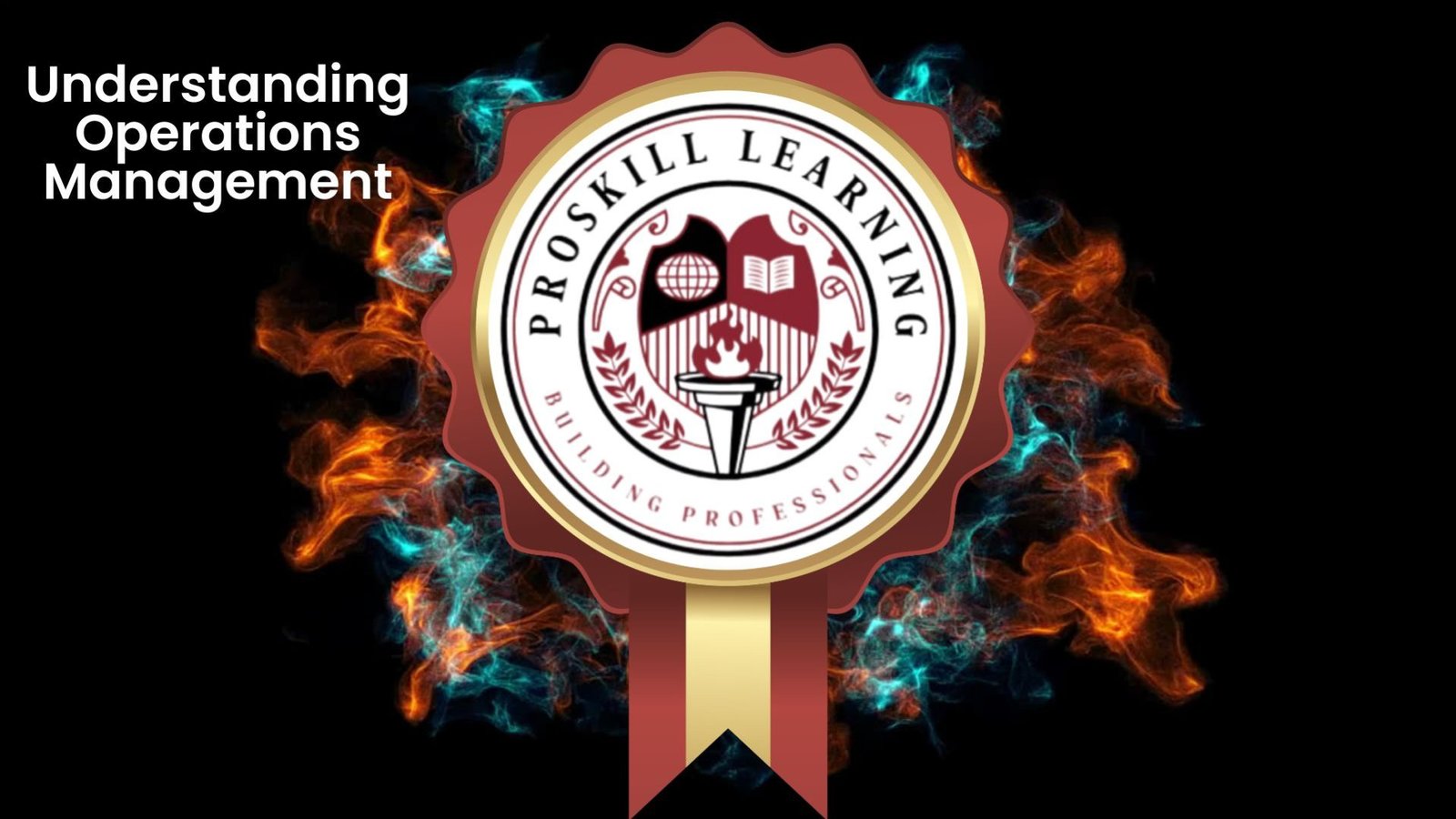Understanding Operations Management
- Description
- Curriculum
- Reviews

This course offers a practical and insightful introduction to Operations Management—the core function that drives the production of goods and services in any organization. Learners will explore key concepts such as the transformation model, process design, capacity management, quality control, and supply chain dynamics. Whether you’re in manufacturing, service delivery, or administration, this course equips you with the tools and knowledge to analyze, improve, and manage operational processes effectively. Ideal for professionals, entrepreneurs, and students seeking to understand how operations create value and deliver customer satisfaction.
-
1Learning Outcomes
After studying this course, you should be able to:
- Define ‘operations’ and ‘operations management’
- Identify the roles and responsibilities of operations managers in different organizational contexts.
- Apply the ‘transformation model’ to identify the inputs, transformation processes, and outputs of an organization.
- Identify operational and administrative processes.
- Describe the boundaries of an operations system, and recognize its interfaces with other functional areas within the organization and with its external environment.
-
2Introduction
Consider the ingredients of your breakfast this morning. Unless you live on a farm and produce them yourself, they passed through a number of different processing steps between the farmer and your table, and were handled by several different organisations.
Similarly, your morning newspaper was created and delivered to you through the interactions of a number of different organisations. Every day, you use a multitude of physical objects and a variety of services.Most of the physical objects have been manufactured, and most of the services have been provided by people in organisations. Just as fish are said to be unaware of the water that surrounds them, most of us give little thought to the organisational processes that produce these goods and services for our use. The study of operations deals with how the goods and services that you buy and consume every day are produced.
-
3Operations, Operations Management and Operations Managers
This lesson introduces the role of operations in organisations, highlighting its importance in producing and delivering goods or services. Learners will explore how operations management involves designing, managing, and improving systems that drive organisational efficiency and customer satisfaction. Whether in the private or public sector, effective operations are key to achieving strategic goals and ensuring value delivery.
-
4Operations, Operations Management and Operations Managers - QuizThese Operations management and manager quiz questions are single-answer questions.
-
5The Historical Development Of Operations Management
The Historical Development of Operations Management
This module explores the evolution of operations management through three major phases: craft manufacturing, mass production, and the modern period.
-
Craft Manufacturing: Characterised by skilled artisans producing customized goods in low volumes, often in small workshops. It emphasized quality and flexibility, with production driven by individual customer needs.
-
Mass Production: Emerged in the 19th century, focusing on high-volume, low-variety goods using standardized parts and assembly lines. Key innovations included interchangeable parts (the American system), scientific management (Taylorism), and Ford’s moving assembly line—greatly enhancing efficiency and lowering costs.
-
Modern Period: Since the 1970s, rising market complexity and customer expectations led to the decline of traditional mass production. New approaches such as lean production, mass customization, flexible specialization, and agile manufacturing have emerged. These methods aim to blend the efficiency of mass production with the flexibility and quality of craft production.
Together, the module highlights how operations management has continuously adapted to technological advances, market demands, and global competition.
-
-
6The Historical Development Of Operations Management - Quiz
-
7The Transformation Model
This module introduces the transformation model—a core framework in operations management used to understand how inputs are converted into outputs through various processes. It breaks down operations into three main components: inputs (resources such as materials, information, and customers), transformation processes (activities that add value), and outputs (goods or services).
The model applies across manufacturing and service sectors, including private and not-for-profit organizations. The module also explores feedback loops used to improve operations, the roles of staff and facilities in transformation, and how ethical, environmental, and customer-focused considerations influence operational decisions. -
8The Transformation Model - QuizAll the questions in this quiz have more than one correct answer
-
9The Boundary of the Operations System
The Boundary of the Operations System
This module explores how the operations function interacts with its external and internal environment. It builds on the transformation model by defining the boundaries of the operations system — the point at which inputs from suppliers enter, and outputs are delivered to customers. It highlights the importance of understanding both external customers and suppliers, as well as internal customers within larger organizations.
The module also introduces the concept of open vs. closed systems in operations. Closed systems isolate the operations function from environmental factors, which may reduce adaptability, while open systems encourage collaboration across boundaries to improve competitiveness.
Finally, the module emphasizes a process-based perspective, recognizing that most operations consist of interconnected micro-processes and that effective coordination—both within and across organizations—is essential for delivering value in complex supply chains.
-
10The Boundary of the Operations System - Quiz








